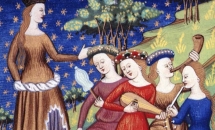Very popular in the 1930s, encouraged by Francoism in the post-war era and often reviled since the arrival of modernity, the copla is a song form that has survived to the present-day with varying fortunes and details, and has become one of the finest subcultural channels for representing the sentimental history of Spain. While the copla is no longer the property of women, both in their lyrics and on stage and on the cinema screen, women tend to dominate the form. From la Piquer to Martirio, from la Pantoja to la Shica, coplas travel and grow in the collective imaginary, filling their trunks with representations of femininity that range from the most abject sexism to militant feminism. Their lyrics reflect the social and legal situation of women in Spain at different points in history, and some famous singers have appropriated these lyrics to subvert the sexist context in which they were created. The copla represents an excellent form for both analysing the link between popular music and gender and for exploring the interpretations of the same musical text in very different historical circumstances and aesthetic contexts.
Cycle: Women and Music
Organized by: Residence for Researches
